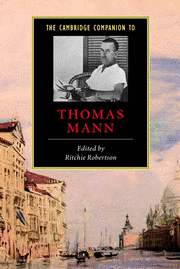Book contents
- Frontmatter
- 1 Mann and history
- 2 The intellectual world of Thomas Mann
- 3 Mann's literary techniques
- 4 Mann's man's world
- 5 Mann's early novellas
- 6 Classicism and its pitfalls
- 7 The political becomes personal
- 8 Buddenbrooks
- 9 The Magic Mountain
- 10 Religion and culture
- 11 Doctor Faustus
- 12 Lotte in Weimar
- 13 The Confessions of Felix Krull, Confidence Man
- 14 Mann as essayist
- 15 Mann as diarist
- 16 Mann in English
- Bibliography
- Index
13 - The Confessions of Felix Krull, Confidence Man
Published online by Cambridge University Press: 28 May 2006
- Frontmatter
- 1 Mann and history
- 2 The intellectual world of Thomas Mann
- 3 Mann's literary techniques
- 4 Mann's man's world
- 5 Mann's early novellas
- 6 Classicism and its pitfalls
- 7 The political becomes personal
- 8 Buddenbrooks
- 9 The Magic Mountain
- 10 Religion and culture
- 11 Doctor Faustus
- 12 Lotte in Weimar
- 13 The Confessions of Felix Krull, Confidence Man
- 14 Mann as essayist
- 15 Mann as diarist
- 16 Mann in English
- Bibliography
- Index
Summary
The genesis of this work spans much of Thomas Mann's creative career. His collection of material dates back to 1910. In 1922 the first part of the book appeared under the title Bekenntnisse des Hochstaplers Felix Krull. Buch der Kindheit [Confessions of Felix Krull, Confidence Man: The Early Years]. In 1951, after his work on Doctor Faustus had once more delayed the continuation of the Confessions, Mann returned to this novel and to his former thematic trajectory. Hans Wysling, in his authoritative study, unfolds the multitude of literary influences and delineates the essential concepts and traditions which informed the Confessions. According to Wysling, the two creative phases are marked by distinctive shifts of models. The early phase is inspired by three major models: Georges Manolescu's memoirs A Prince of Thieves (1905), Goethe's autobiography Dichtung und Wahrheit [Poetry and Truth], which is part of the great eighteenth-century tradition of autobiographical and confessional writing, and the fairy-tale motif of the Glückskind, the fortunate child. All three models are more or less refracted and modified by other concepts. For example, Manolescu's literary memoirs of a self-proclaimed confidence man are problematised by the Protestant ethic of self-examination and the psychoanalytical school of self-interrogation. Whereas Felix Krull's imitation of Goethe's Poetry and Truth lacks the aspects of societal integration and self-realisation so essential to the eighteenth-century ethos of Bildung or self-cultivation, the deployment of the fairy-tale plot of the Glückskind is enriched both by the psychoanalytical complex of primary narcissism, which is symptomatic for the early stage of childhood development, and by the mythological features of collective archetypes. The protagonist's name Felix, signifying the happy one, is onomastic testimony to the felicitous nature and fate of his composite psychomythic character.
- Type
- Chapter
- Information
- The Cambridge Companion to Thomas Mann , pp. 199 - 212Publisher: Cambridge University PressPrint publication year: 2001



